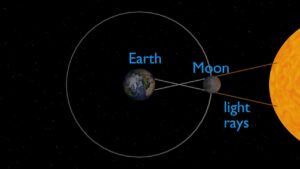Introduction to Solar Eclipse 2024
On April 8, Monday, 2024, sky gazers and astronomy enthusiasts around the globe will be treated to a breathtaking spectacle: the first solar eclipse of the year. According to NASA’s website, this celestial phenomenon is no ordinary event—it’s a total solar eclipse, promising an awe-inspiring display of nature’s grandeur.
What is a Solar Eclipse?

A solar eclipse occurs when the moon passes between the sun and the earth, blocking all or part of the sun’s rays from reaching the earth.
This creates a temporary shadow on our planet, casting darkness during daylight hours.
The Significance of Solar Eclipses
Solar eclipses have captivated human imagination for centuries, inspiring myths, legends, and scientific inquiry. These events serve as reminders of the vastness and complexity of our universe, prompting us to contemplate our place within it.
Visibility of Solar Eclipse 2024

The upcoming solar eclipse of 2024 will be a sight to behold for observers in various parts of the world.
- Regions fortunate enough to witness this cosmic spectacle include North America, Western Europe, Atlantic, the Pacific, Central America, Arctic, and certain parts of England and Ireland.
Countries Where Solar Eclipse 2024 Will be Visible
Among the lucky countries set to experience the full splendor of the solar eclipse are Mexico, the United States, Canada, and several others in North America.
- The Northwestern region of England and Ireland will also have the opportunity to witness this celestial event.
Why Solar Eclipse 2024 Won’t be Visible in India
Unfortunately, for sky gazers in India, the solar eclipse of 2024 will remain out of sight.
Despite its grandeur, this cosmic phenomenon will not grace the skies of the Indian subcontinent.
Last Solar Eclipse in India
The last solar eclipse visible in India occurred on December 26, 2019.
- It was an annular solar eclipse, casting its shadow over parts of Asia and Australia, as well as Saudi Arabia, Sumatra, and Borneo.
Next Solar Eclipse in India
India won’t have to wait too long for its next celestial show.
On May 21, 2031, an annular solar eclipse will be visible in several Indian cities, including Kochi, Alappuzha, Madurai, and Vedaranyam, among others.
Chaitra Navratri 2024 and Surya Grahan 2024
It is a unique occurrence that the shadow of a solar eclipse is falling on Chaitra Navratri. The solar eclipse (Surya Grahan) is set to occur during Chaitra Navratri 2024.
It will begin on the night of April 8th at 9:12 PM and will last until 2:22 AM on April 9th. Chaitra Navratri festivities according to the Hindu calendar have already commenced from April 9th.
- What’s noteworthy is that despite the eclipse, it won’t have any effect on the Navratri puja since this solar eclipse won’t be visible in India. It will only be visible in regions like North America.
Preparation for Viewing Solar Eclipses
Viewing a solar eclipse requires careful preparation and safety measures to protect your eyes from harmful solar radiation.
- Specialized solar viewing glasses or telescopes equipped with solar filters are essential tools for safely observing this phenomenon.
Safety Measures During Solar Eclipse Viewing

It’s crucial to never look directly at the sun without proper eye protection, as this can cause permanent damage to your vision.
- Additionally, indirect viewing methods such as pinhole projectors or solar eclipse glasses offer safe alternatives for experiencing the eclipse.
Understanding Total Solar Eclipse
A total solar eclipse occurs when the moon completely covers the sun, casting a shadow on the earth and plunging the surrounding area into darkness. Witnessing this rare event is a once-in-a-lifetime experience for many, evoking a sense of wonder and awe.
Some FAQs on Total Solar eclipse of 2024
1. Can I use regular sunglasses to view a solar eclipse?
Ans: No, regular sunglasses do not provide adequate protection from the sun’s harmful rays during a solar eclipse. It’s essential to use specialized solar viewing glasses or equipment with solar filters.
2. Why are solar eclipses so rare?
Ans: Solar eclipses are relatively rare because they require precise alignment of the sun, moon, and earth. Additionally, the moon’s orbit is tilted relative to the earth’s orbit, making it less likely for these alignments to occur frequently.
3. Are there any cultural traditions associated with solar eclipses?
Ans: Yes, many cultures have myths, legends, and rituals surrounding solar eclipses. Some view them as omens of impending disaster, while others see them as opportunities for spiritual reflection and renewal.
4. How long does a solar eclipse typically last?
Ans: The duration of a solar eclipse can vary depending on factors such as the type of eclipse and the observer’s location. Total solar eclipses typically last for a few minutes, while partial eclipses may span several hours.
5. Can animals sense solar eclipses?
Ans: Some animals may exhibit unusual behavior during a solar eclipse, such as birds returning to their nests or nocturnal animals becoming active. However, scientific studies on this topic are limited, and more research is needed to fully understand animal reactions to eclipses.
Thanks
Happy Reading!











